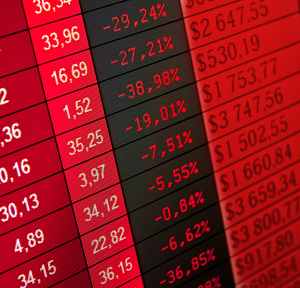Investment Strategies
News Analysis: China's Market Tests Nerves But No Need To Panic Yet - Wealth Managers

Should investors panic about China? No, seems to be the response from a number of wealth managers.
We are barely two weeks into 2016 and already, as this publication speaks to wealth managers, China looms high in concerns people have about the likely direction for markets this year. However, although Chinese mainland shares are down this year and there are fears of more falls to come – there is by no means a solid consensus saying 2016 is going to be a miserable year.
Yesterday, mainland stocks rose at the open but later sagged and the Shanghai Composite Index dropped 2.42 per cent, closing below 3,000 points for the first time since 26 August last year; the Shenzhen Component Index closed down 3.06 per cent.
Should investors hunker down for typhoons ahead? At Schroders, the private bank and investment house, Craig Botham, emerging markets economist, is arguing for a relatively benign view. “We are not worried about equity market weakness in China, nor do we yet see renewed macro weakness beyond softer manufacturing data on the back of pollution related factory shutdowns. The main risk posed by China presently is currency weakness, given the deflation this exports. We do expect macro weakness to renew as stimulus effects fade, but still we would not regard this as signalling an impending hard landing,” Botham said in note.
The same kind of attitude comes from David Lafferty, who is chief market strategist at Natixis Global Asset Management. “First, we say don’t overreact because investors should remember that the onshore Chinese equity markets are highly volatile and driven by retail investor sentiment. As a result, they are not necessarily indicative of wider stress in the global financial system. To be clear, the broad slowdown in the Chinese economy is a dominant investment theme and cause for concern. However, China’s periodic equity sell-offs should not have lasting material effects on broader markets,” he said.
“Second,” Lafferty added, “we say that investors should get used to it because the theme of China slowing is going to be with us for some time. This is not an 'event' or 'cycle'; China is undergoing a necessary and positive adjustment, rebalancing away from heavy manufacturing, infrastructure, and exports towards domestic consumption and services. This will take years. Nature abhors a vacuum, so expect stories about 'China faltering' to punctuate every slow news cycle. Expect it, don’t fear it.” He said the slowdown actually creates buying opportunities in specific markets.
That sort of “don’t panic” view contrasts with some remarkably loud warnings of economic doom for the global economy – with China a factor – in recent days. For example, Societe Generale strategist Albert Edwards reportedly has warned of a repeat of the 2008 financial crisis, which could endanger the eurozone. That warning came after Royal Bank of Scotland analysts put out a “sell everything” note, warning of a stock market meltdown.
Equity weakness is not economic weakness
Schroders’ Botham argues that market weakness in China is not the
same as economic weakness. “The renewed weakness is technical,
not fundamental. Nor, as we pointed out last year, does weakness
in the equity market generate economic weakness; wealth effects
are much smaller than in the US given a much lower rate of share
ownership,” he said.
“As an indicator for global macroeconomic health, the Chinese equity market carries very little leading information. Our own view on the economy is that China is seeing some stabilisation and even a rebound in certain areas, as data from the past few months would indicate. While the recent PMIs are less encouraging, we would hesitate to attach too much weight to a single data point particularly given the pollution-related shutdowns which likely weigh on manufacturing activity,” Botham said.
He considers whether a weaker yuan, or renminbi, exchange rate might be encouraging outflows from China, noting a widening spread between the offshore and onshore yuan rates.
“We would firstly note that FX weakness has so far largely been in line with the trade-weighted basket which the authorities believe is a 'more appropriate reference' for the currency than the bilateral rate versus the dollar. Intervention aimed at reducing the spread against the offshore yuan has seen trade weighted depreciation but this is unlikely to persist, in our view. Further weakness against the dollar is to be expected in a world of dollar strength, but the question then is whether the authorities will continue with the existing policy of gradual depreciation or pursue a more aggressive one-off devaluation, and drive down the trade-weighted exchange rate which is a bigger threat to the rest of the world,” Botham said.
He argues that the forex debt burden for China is relatively small compared to Chinese gross domestic product in percentage terms and has been cut since the currency devaluation of August. Inflation rates remain low. In general, Botham said, the macroeconomic risks from a large currency devaluation seem to be limited.
At Psigma, the UK-based investment house, its chief investment officer, Tom Becket, told this publication that he is not expecting a hard landing for China although he said that "the economy is suffering, no doubt about that". He said that China's 6 per cent devaluation in its currency last year is far less, in terms of severity, than devaluations seen in countries such as South Africa and Russia.
Becket also argued that Asian ex-Japan equities, at a price-to-earnings ratio of 9 times earnings, are as cheap as they have been since 2008 and yet Asia is not - at least not yet - in a financial crisis.
One issue of note, Becket said, is that with the sharp falls of the oil price in recent weeks, this will reduce the spending power of those sovereign wealth funds in regions such as the Middle East that have been significant equity buyers in recent years.